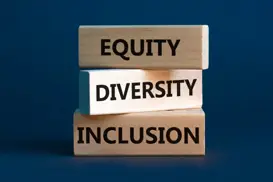How AI impacts workplace DE&I and hiring
In today's fast-changing workplace, artificial intelligence (AI) is becoming integral to business operations. A notable domain of AI's transformative influence is in DE&I and hiring. Let's explore How AI impacts workplace DE&I and hiring with Aniday, examining both the positive and negative implications, along with strategies for responsible implementation.
Definitions of D&E
To begin, let's define Diversity, Equity, and Inclusion (DE&I) and Artificial Intelligence (AI) in the workplace.
1. Diversity, Equity, and Inclusion (DE&I) in the Workplace:

Alt: how-ai-impacts-workplace-dei-and-hiring (2)
Caption: What is DE&I?
Diversity acknowledges and celebrates differences in race, ethnicity, gender, sexual orientation, age, abilities, and more. Equity ensures fairness, recognizing varied support needs. Inclusion actively creates an environment where every individual feels valued and heard in decision-making processes. Together, they form a comprehensive approach for an inclusive, fair, and collaborative workplace culture.
2. Artificial Intelligence (AI) in the Workplace:
Artificial Intelligence (AI) encompasses the creation of computer systems capable of emulating human intelligence. These systems excel at learning from experience, identifying patterns, solving intricate problems, and making informed decisions.
In professional settings, the applications of AI span from automating mundane tasks to orchestrating sophisticated decision-making processes. In the context of DE&I, AI can be employed in recruitment processes to enhance objectivity, efficiency, and inclusivity in identifying and selecting talent.
The use of AI in hiring
AI is being used in a variety of ways in hiring, including:
-
Automating tasks: AI can be used to automate tasks such as screening resumes, scheduling interviews, and conducting reference checks. This can free up human recruiters to focus on more strategic tasks.
-
Recognizing patterns: AI excels in discerning data patterns, aiding in the identification of candidates likely to thrive in specific roles. This knowledge empowers organizations to make more informed hiring decisions.
-
Decision-making: Leveraging AI for decisions like candidate selection and job offers mitigates unconscious bias in the hiring process, contributing to fairer and more objective outcomes.
Positive Impacts of AI on DE&I and Hiring

The infusion of Artificial Intelligence (AI) into the hiring process heralds a new era of possibilities, particularly in advancing Diversity, Equity, and Inclusion (DE&I) within workplaces. The positive impacts of AI extend beyond efficiency gains, promising transformative changes in how organizations identify, attract, and retain a diverse talent pool.
-
Diverse Candidate Pool: AI empowers organizations to cast a wider net, actively identifying and attracting candidates from diverse backgrounds. By leveraging sophisticated algorithms, AI can analyze a broader range of data points to recognize potential in individuals who might have been overlooked in traditional recruitment processes.
-
Enhanced Understanding of Company Requirements: AI's analytical capabilities extend to understanding the nuanced requirements of an organization. By processing vast datasets related to successful employees and organizational culture, AI can refine candidate matching, ensuring a more precise alignment between the skills, values, and experiences of candidates and the company's needs.
-
Efficient Information Synthesis: AI's ability to swiftly process large volumes of data significantly enhances the efficiency of decision-making in recruitment. This means recruiters can focus more on strategic aspects of hiring, such as fostering diversity, rather than spending excessive time on administrative tasks.
-
Identification of Missed Opportunities: AI's predictive capabilities can uncover latent talent that traditional methods might miss. By identifying patterns in successful hires and leveraging this insight, AI assists in recognizing individuals with unique qualities or non-traditional backgrounds that can contribute to a diverse and dynamic workplace.
-
Time Savings in Job Searches: Automation introduced by AI streamlines the hiring process, reducing the time and resources spent on repetitive tasks. This time efficiency not only accelerates the recruitment timeline but also allows recruiters to allocate more time to cultivating diverse talent pipelines and building relationships with candidates.
Negative Impacts of AI on DE&I and Hiring

Despite the numerous benefits AI brings to the hiring process, it's crucial to scrutinize potential negative impacts, especially concerning Diversity, Equity, and Inclusion (DE&I). Acknowledging these challenges is vital for organizations committed to fostering fair and inclusive hiring practices.
-
Data Bias Risk: AI algorithms, reliant on training data, inherent biases present in that data. If the data is biased, the algorithm itself becomes biased, posing a risk of discriminatory outcomes, particularly against underrepresented groups.
-
Historical Biases: AI algorithms may inadvertently perpetuate biases existing in the historical data used for training. Even if these biases are unintentional, they can result in discriminatory outcomes, disadvantaged underrepresented groups in the hiring process.
-
Reduced Individual Expression: The use of AI in hiring decisions may limit the consideration of unique qualities possessed by each candidate. This restriction can diminish individual expression and potentially contribute to a reduction in diversity within the workforce.
-
Difficulty in Differentiation: AI-driven hiring decisions may obscure the reasons behind the selection of one candidate over another. This lack of transparency makes it challenging to differentiate between candidates and can lead to a loss of diversity and accountability in the hiring process.
Strategies for using AI for inclusive hiring
Organizations can take steps to mitigate the challenges of using AI in hiring. These steps include:
-
Continuously monitor and test AI algorithms: Organizations should regularly monitor their AI algorithms for signs of bias. They should also test the algorithms on a diverse group of candidates to ensure that they are fair and accurate.
-
Periodically assess AI algorithm fairness: Establish a process for regular evaluations, scrutinizing both the training data and algorithm outputs.
-
Correct identified biases promptly: Take corrective actions if biases are detected, involving updates to training data or adjustments to algorithm parameters.
-
Promote diversity in AI development teams: Encourage diverse perspectives in AI development to enhance the creation of algorithms that consider a variety of viewpoints.
In addition to these strategies, organizations can also take steps to ensure that AI is used in a way that is inclusive. These steps include:
-
AI as a supplement, not a replacement: Utilize AI to enhance human decision-making, not to replace it entirely.
-
Ensure transparency in AI algorithms: Organizations should prioritize transparency in AI algorithms, allowing humans to comprehend their functionality.
-
Provide opportunities for feedback: Organizations should provide opportunities for candidates and employees to provide feedback on the use of AI in hiring.
Conclusion
So, Aniday has offered a comprehensive overview of How AI impacts workplace DE&I and hiring. By taking steps to mitigate these challenges, organizations can help to ensure that AI is used in a way that is fair and inclusive.
Aniday's HR Services
Headhunting Service
Find and recruit quality candidates in just 1 week! Supported by 40,000 experienced headhunters in IT, Finance, Marketing… capable of recruiting in any region.
Headhunting Service ➔Employer of Record (EOR) Service
On behalf of your business, we recruit employees and handle payroll without the need to establish a company in markets such as Vietnam, Singapore, Malaysia, India, Indonesia…
Employer of Record (EOR) Service ➔